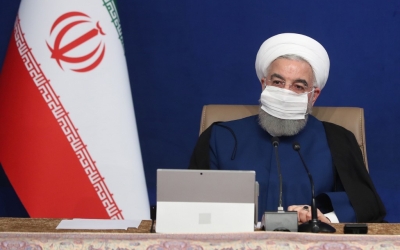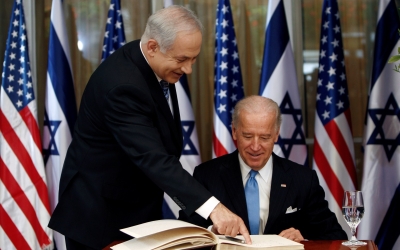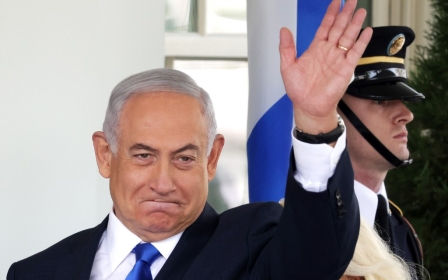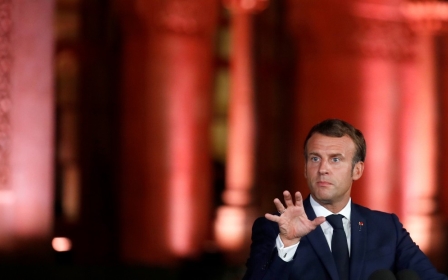Hezbollah revels in Trump's defeat and anticipates easing of US pressure
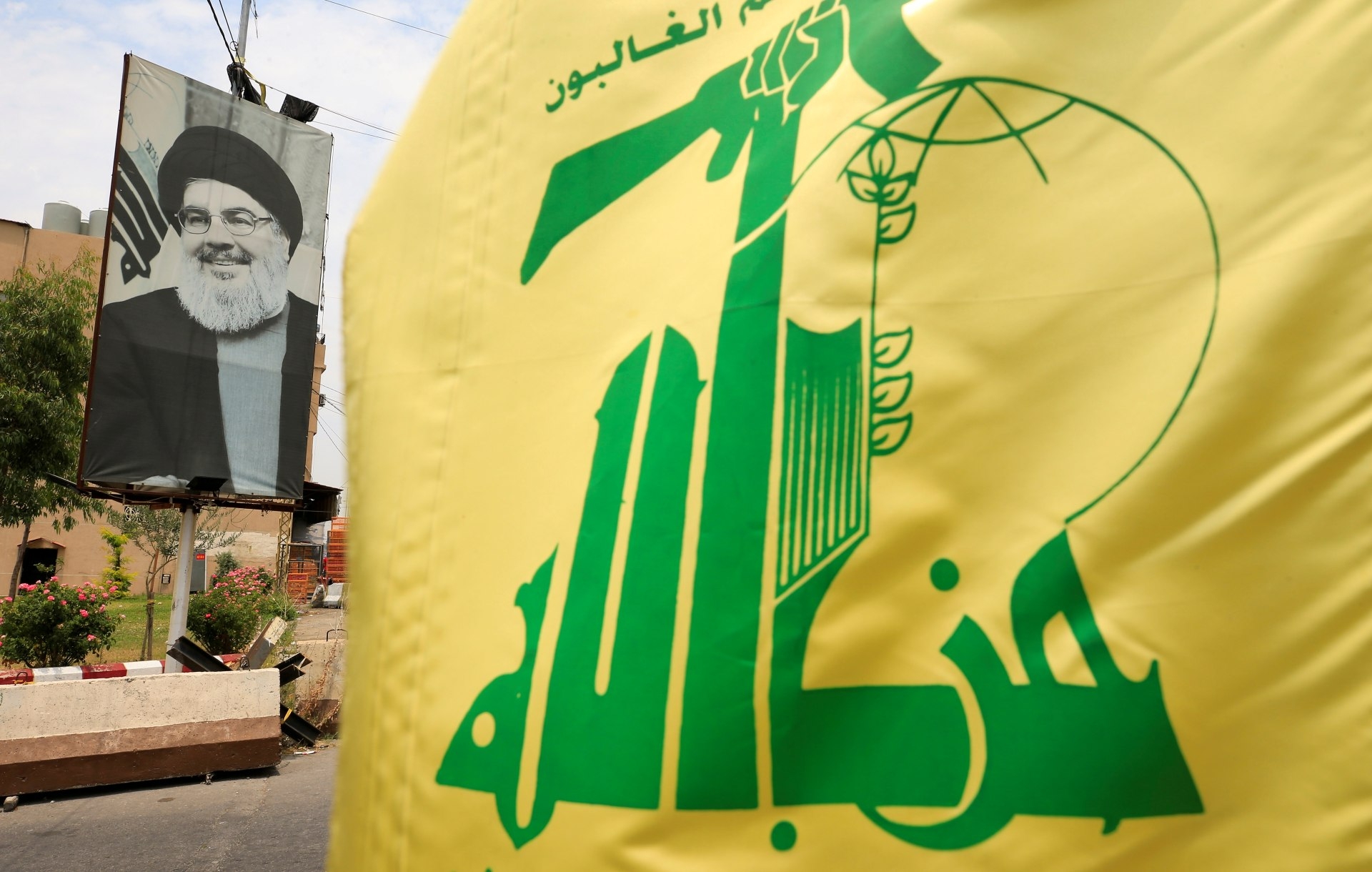
In the southern suburbs of Beirut, Hezbollah’s stronghold, houses last week resonated with live coverage of the US elections.
Much has been at stake for Hezbollah, battered by four years of the “maximum pressure” policy on Iran and its allies, adopted by President Donald Trump’s administration.
Washington’s approach resulted in multiple sanctions on Hezbollah members and companies linked to the party, and seriously hindered its cash flow from Iran. Now that Joe Biden has won the US election, Hezbollah believes its fortunes may turn once again in Lebanon and in the wider region.
'Everyone has been following the American elections in Beirut’s southern suburbs and rooting for Biden, whether they are Hezbollah supporters or militants'
- Source close to Hezbollah commanders
Supporters and analysts close to the party have either rejoiced or shown cautious optimism towards the Democratic candidate’s victory.
Hezbollah’s general secretary said on Wednesday he was happy about “the humiliating downfall” of Trump, who he accused of having no restraints, adding that “arrogance and aggressiveness” had heightened the possibility of war.
“Everyone has been following the American elections in Beirut’s southern suburbs and rooting for Biden, whether they are Hezbollah supporters or militants,” a source close to Hezbollah commanders told Middle East Eye.
“People believe that Biden will be more lenient on Iran and will go back to making a deal with Tehran, which will be consequently good for Hezbollah,” the source added, speaking on condition of anonymity due to sensitivities.
A return to the JCPOA
In the past four years, Trump’s policies have seriously hampered Hezbollah’s money-laundering activity, forced close a Lebanese bank that dealt with the party, while sanctioning its political allies for abusing their government position - most recently Gebran Bassil, son-in law of Lebanese President Michel Aoun and former foreign minister.
The economic siege imposed by Washington on Iran has proven to be costly for Hezbollah, which until 2018 received about $700m annually from Tehran.
Slain Iraqi analyst Hisham Hashemi told MEE before his death that Iran’s financial woes had forced the group to become partly financially dependent on pro-Iran factions of Iraq’s Hashd al-Shaabi paramilitary, which is estimated to generate $2bn-$3bn yearly from oil trade and other illicit activities.
Biden has stated that if he won the election, he would end Trump’s maximum pressure policy against Tehran and would re-enter the 2015 JCPOA Iranian nuclear deal that Trump unilaterally withdrew from in 2018 before issuing a raft of new sanctions.
A revisited deal with Iran would allow it to again sell its oil on international markets, with Iranian cash eventually trickling down into Hezbollah hands.
“Biden will definitely come back to the Joint Comprehensive Plan of Action [JCPOA]. This opens a new horizon for Hezbollah and Iran, because any new negotiations will result in relieved pressure on Hezbollah,” says Brahim Beyram, a Lebanese journalist and analyst close to the group who spoke to the Middle East Eye.
“A return to the JCPOA would also translate into an improvement of Lebanon’s financial situation as we will see less of a liquidity crisis,” adds Beyram.
Hezbollah has largely blamed Lebanon dollar shortages on a dollar embargo imposed by Washington. In reality, it is largely due to the political class’ rampant corruption, which resulted in Lebanon’s March 2020 default on $90bn debt.
Since then, dollars - largely used in Lebanon and officially pegged to the currency - have been scarce. Subsequent currency devaluation has disproportionally affected the poor and middle class, with inflation affecting food prices by an average of 142.2 percent over the first seven months in 2020, according to the World Bank. Over half of the population is now under the poverty line.
“Hezbollah’s financial problems due to US sanctions have forced it to cut a lot of the subsidies it provides to its fighters. As an example, wounded fighters are barely getting any treatment or medication, and have lost the disability pension they received in addition to their salary. A relief of sanctions could mean a change of fortune for Hezbollah,” said the source.
It’s likely Biden will attempt to take the path adopted by former President Barack Obama, pro-Hezbollah analysts expect, which will also mean a possibility of returning assets to Iran, if a deal is reached.
In 2016, the Obama administration acknowledged a transfer of $1.7bn to Iran that was made entirely in cash. The payment was the settlement of a decades-old arbitration claim between the countries.
Difficult transition
Kassem Kassir, a Lebanese analyst with close ties to Hezbollah, is nonetheless more cautious about Biden’s foreign policy towards the group.
“The party will remain in a difficult situation until Trump leaves the White house and Biden takes over,” he told Middle East Eye.
However, the analyst notes, the Axis of Resistance group of pro-Iran countries and parties has been able to maintain cohesion despite Trump’s maximum pressure strategy and the assassination of top Iranian general Qassem Soleimani.
'The party will remain in a difficult situation until Trump leaves the White house and Biden takes over'
- Kassem Kassir, analyst
“Biden’s victory benefits Iran and Hezbollah, more specifically with a return to the JCPOA and an end of the sanctions. In Iraq, the situation will greatly depend on the US forces’ strategy there and whether they decide to withdraw,” he adds.
Under Trump, confrontation between the US and Iran has been escalating in Iraq. In January, Iraq’s parliament passed a resolution calling on the government to end all foreign troop presence in Iraq, as a backlash grew after the killing of Soleimani in a US drone strike on Baghdad airport.
In recent months, sporadic rocket attacks on US and foreign interests have increased, Iranian proxies are suspected to have attacked Saudi oil facilities from Iraq, and Iran-backed groups have persecuted Iraqi protesters who opposed Iran’s domination.
Hezbollah’s role has been instrumental in this phase. The clout of Hezbollah's commander in Iraq, Mohamad Kawtharani, only grew after Soleimani’s death as he was entrusted with smoothing out rivalries between pro-Iran militant groups there.
“Iraq finds itself in a very similar situation to Lebanon and Iran, and Hezbollah there will be more comfortable with Biden as president of the United States, for similar reasons,” said Beyram.
No quick change
Yet, US foreign policy in the near term is unlikely to change much towards Hezbollah. Al-Akhbar, a pro-Hezbollah Lebanese newspaper, predicts Biden might find his agenda to be challenged by a Republican-controlled Senate.
Additionally, many of the US sanctions against the party garnered bipartisan votes.
Michael Young, analyst and senior editor at Carnegie Middle East Center, says any engagement with Iran will have to take into account Gulf Arab concerns over long-range missiles and recent normalisation deals with Israel.
“I think a lot of the foreign policy towards Iran might remain the same,” Young told MEE.
Nonetheless, any fresh diplomatic engagement with Tehran should translate to a softening of economic sanctions on the Islamic Republic.
This, as minute as it is, will result in a financial boon for Hezbollah, given Lebanon’s battered economy.
Many Hezbollah supporters have told MEE their trust in the party has been eroded by alliances with corrupt politicians, and the heroics of conflict against Israel in 2006 and before are not even distant memories for the more youthful supporters.
Flushed again with cash, the Lebanese movement could start to regain the hearts and minds of people drifting from its ranks, particularly since the anti-establishment uprising that began in October 2019.
This article is available in French on Middle East Eye French edition.
Middle East Eye propose une couverture et une analyse indépendantes et incomparables du Moyen-Orient, de l’Afrique du Nord et d’autres régions du monde. Pour en savoir plus sur la reprise de ce contenu et les frais qui s’appliquent, veuillez remplir ce formulaire [en anglais]. Pour en savoir plus sur MEE, cliquez ici [en anglais].


